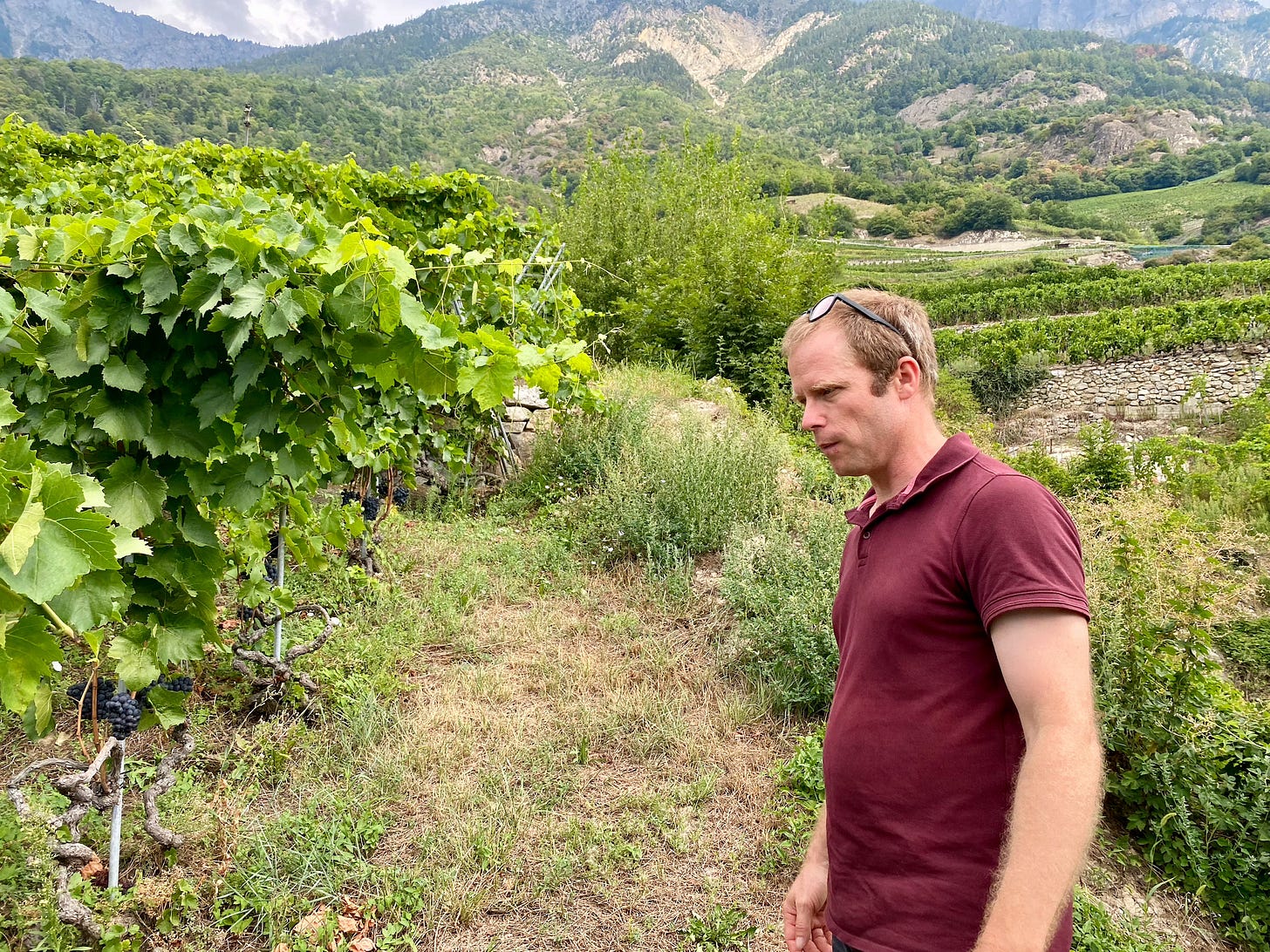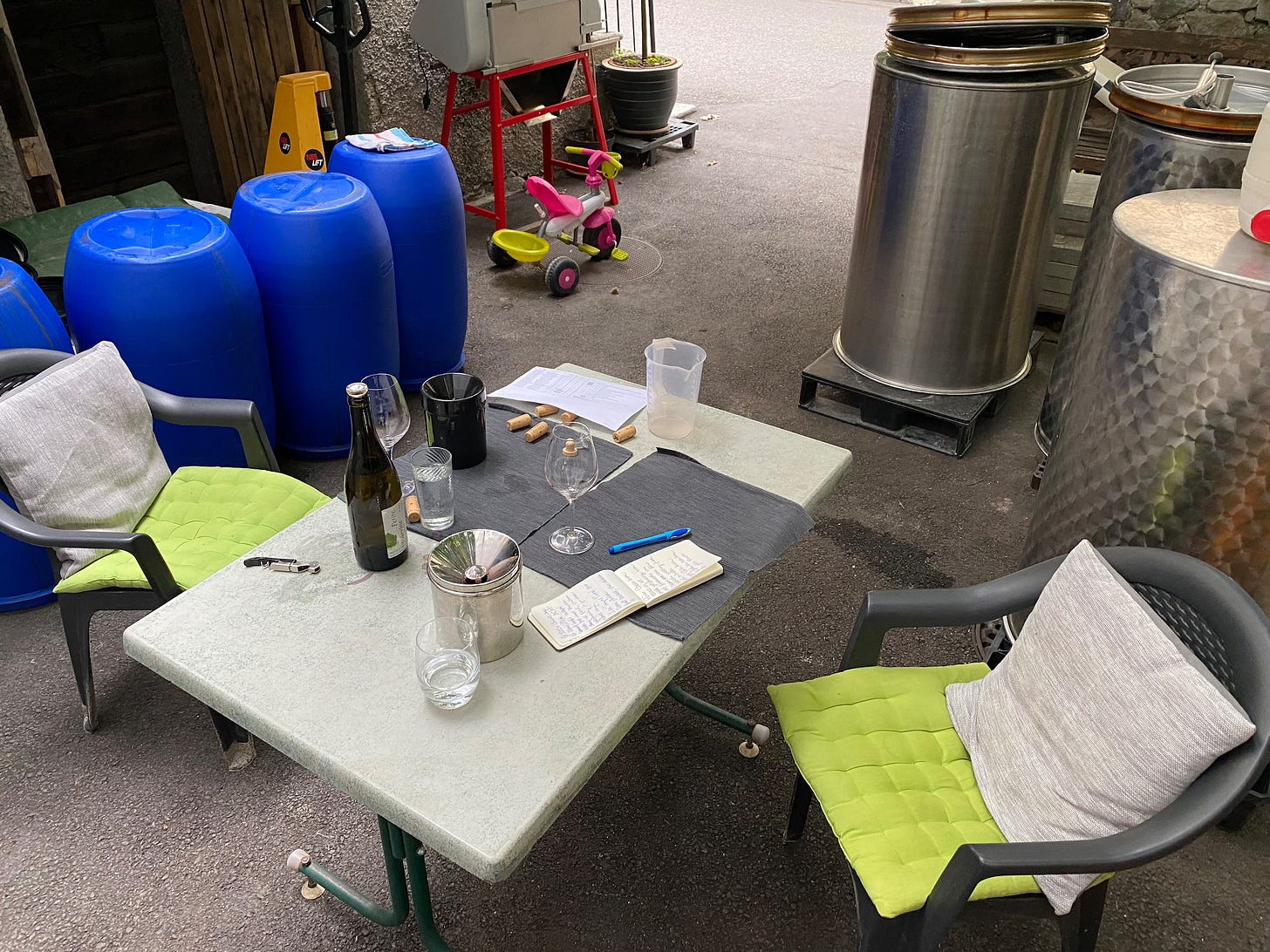Olivier Pittet, Fully, AOC Valais
Visiting an incredibly dedicated part-time winemaker in the most spectacular wine-growing region in Switzerland
If you take the elements of the Rhône, weathered rock, gneiss, limestone deposits, Syrah, and perfectly south-facing vineyards, you might automatically think of Hermitage. But no, first the Rhône flows through the Valais, not far from its source at the Furka Pass. This valley, which is already a geological and climatic uniqueness, not only boasts countless indigenous grape varieties (one of which even has three different names within the valley), the highest vineyard in Europe, and a parcel division otherwise only found in Burgundy, but also a microclimate protected by massive rock walls. Thanks to the locally named Foehn, a warm wind constantly blows through the valley, giving the region a Mediterranean flair.
Burgundian traits and a unique microclimate
One who has set out to trace the origins of indigenous grape varieties, with a particular fondness for old vines, is Olivier Pittet. Born in 1975.
He has settled in Fully, which is practically in the valley floor of the Valais, near Martigny. Just before the Rhône makes a bend and no longer flows in a perfect east-west direction, but starts to gradually open northwest towards Lake Geneva. Olivier cultivates about 1 hectare of vineyard, fragmented into many small parcels, which he has gradually acquired since 2005. He still does this part-time, but perhaps another door for expansion will soon open for him. Because Olivier would love to work with wine all day.
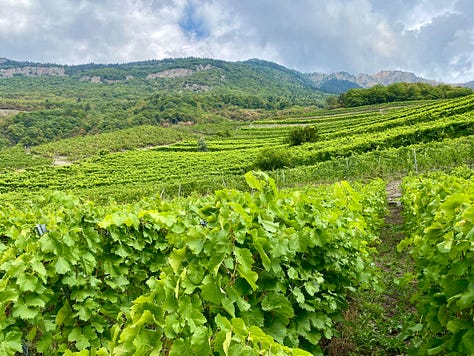
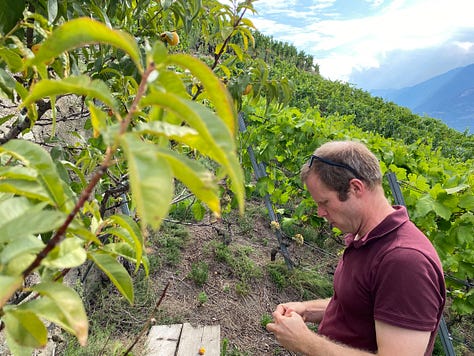
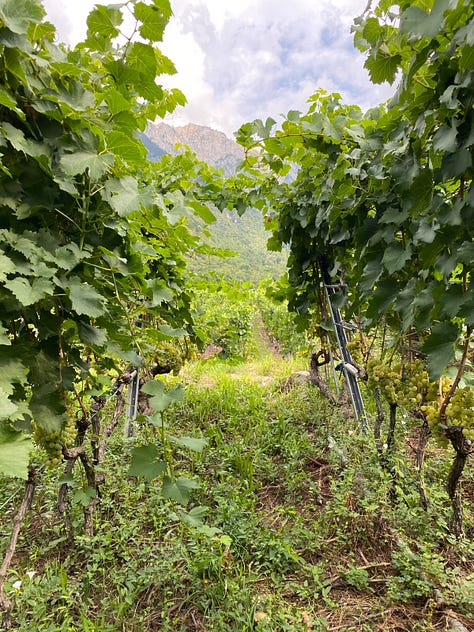
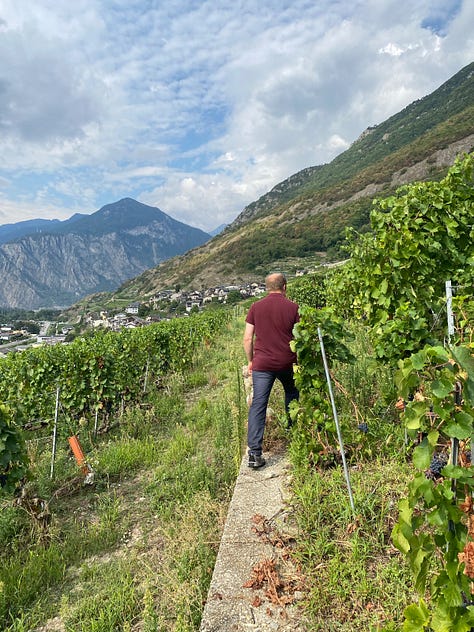
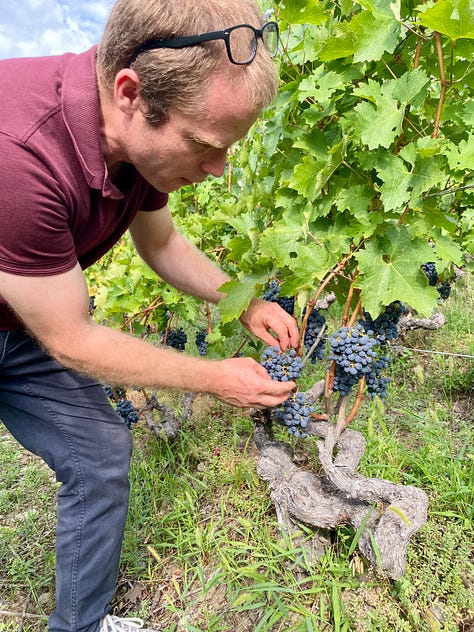
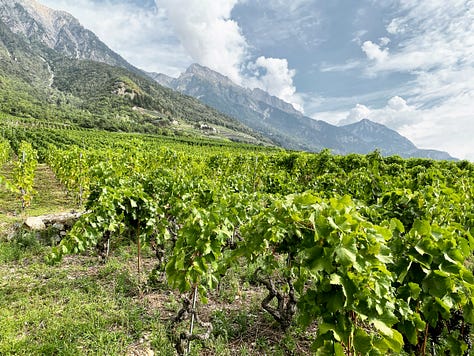
Discoverer of lost treasures
A few years ago, during his research, he came across indications of the old and believed-to-be-extinct variety "Grosse Arvine." He actually found a few old vines and rehabilitated them on a small parcel.
Another indigenous grape variety, which existed exclusively around the village of Fully, is Durize, also known by the more melodious name "Rouge de Fully."
Other grape varieties in his portfolio include Petite Arvine, Païen (also known as Savagnin or Heida), Gamay, Syrah, as well as Cabernet Sauvignon, Pinot Gris, and Silvaner. Olivier appreciates this diversity, as he also enjoys experimenting in the cellar, creating different cuvées for some wines in various years.
Fine-tuning in the vineyard
Olivier strikes me as very energetic. I wouldn’t say driven, but he knows what he’s looking for and what kind of wines he wants to produce. Many of his vines are 40 years old or older, and many are traditionally trained as goblets, through which he has quickly implemented a trellis system. He increases the planting density to 17,000 vines per hectare, double the usual density in Burgundy, and besides green harvesting, he doesn’t use pruning. Instead, he trains the vines into a nearly 1.5-meter-high leaf wall and weaves the shoots together. "You don't just cut off a snake's head," he says, meaning that the shoots of the vine are its head, helping it orient and self-regulate. The leaves are small, as are the grapes. Everything already points to what I can expect in the glass: concentration!
Olivier puts most of his effort into his vineyards. Little work is needed in the cellar, he says. He ferments spontaneously and matures his wines in small barriques, demijohns, or clay eggs, utilizing the natural gravity in the processing of the grapes.
We taste:
Durize (Rouge de Fully) 2020, and the 2021 barrel sample
Superb fruit bouquet, very juicy and fresh. Full of ripe fruit. The nose is filled with raspberry and blackberry notes, dark and deep. The acidity is pronounced and fresh, cutting through the fruit and providing good length. I find the fruit a bit warm, not quite harmoniously matched with the cooler acidity. A retasting at the correct temperature would be advisable.
Racine (100% Gamay) 2020, and the 2021 barrel sample
The barrel sample is very fresh, with great drive and juiciness. It’s pure, clean, and jumps out at you. Blueberries, cherries, some tea leaves, and green olive tapenade. All finely balanced. The tannins are light, subtly emphasized, with medium+ length. The bottle, on the other hand, first appears reductive. I get chocolate and green elements. Olivier mentions that some stems are included, and besides destemmed and crushed grapes, he also processes whole clusters. On the palate, the wine is extremely concentrated and brings a fine minerality. Cherry, bay leaf, and kitchen herbs. Again, I find the fruit a bit too warm.
Chimere Rouge 2021 (Cabernet Sauvignon, Syrah) barrel sample
Dense and mineral, but also finely salty. Lots of power. Red and black fruit with roasted notes and chocolate. Always juicy, always long.
Syrah de Fully (Syrah) 2021 barrel sample
Wonderful expressive nose, tremendous density. Red, juicy fruit. However, there's a bit too much tannin (stems), but the fruit is fine, perfumed, very elegant, and beautiful.
Chimere Orange 2018 barrel sample
Almost Madeira-like in taste. Super clean, great acidity. Nothing seems to be missing. Nevertheless, somewhat mature. He’s not yet sure what to do with it. Perhaps he’ll blend it with 2020 demijohn and some 2021 lees to bring back the freshness.
Chimere Orange 2020 (85% Silvaner, 15% Pinot Gris)
Slightly broader on the palate, more glycerin. Also tends towards Madeira-like qualities. Beautifully perfumed, floral, and yellow-fruited nose. The tannin is almost imperceptible.
Les Temps Passé (Grosse Arvine) 2020
Full-bodied, yellow fruit, somewhat alcoholic.
Paien, Grosse Arvine 2020
Mild yellow-fruited nose with beeswax. On the palate, a burst of acidity. Straightforward, fresh, herbal, with a beautiful citrus note.
Petite Arvine 2019
Arguably the best wine. Best nose. Yellow fruit. Flint and salinity on the palate, great density and length. Built to last.
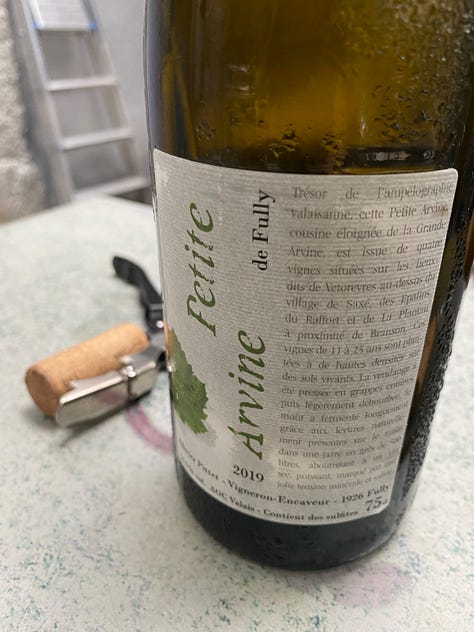
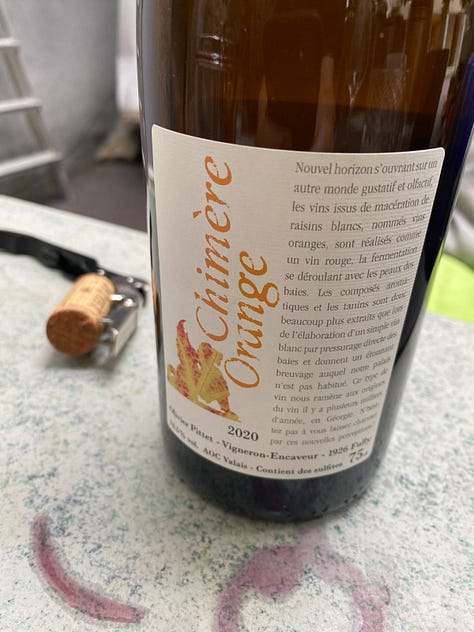
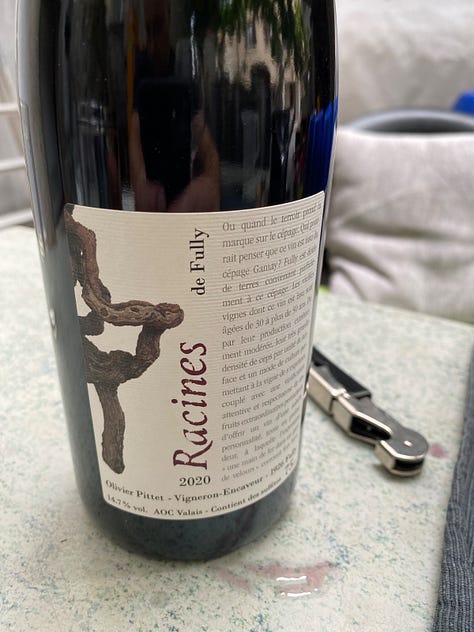
Cultural heritage and foresight into the future
It's worth tasting Olivier Pittet's wines and following his further development. His wines are characterful and unique. His commitment to preserving the indigenous grape varieties of the Valais is also a contribution to the preservation of Switzerland's cultural heritage. Not only in Switzerland are rediscovered "old" grape varieties well-equipped for the climatic changes that the coming years will bring.
Olivier Pittet's wines are currently available through the Brancaia wine shop in Zurich.


